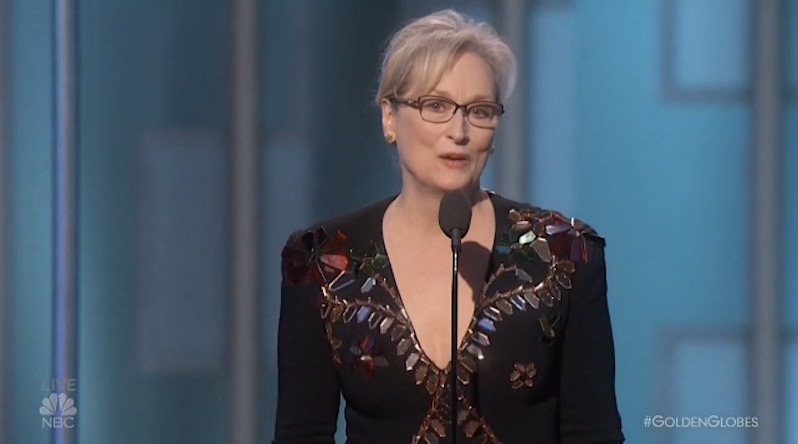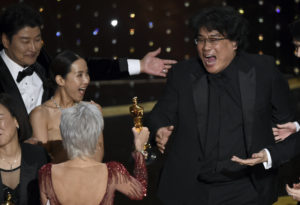Hollywood Gets a Clue About Inclusion, Meryl Streep Gets Political at 2017 Golden Globes (Video)
This year's Golden Globes outperforms recent Academy Awards in terms of minority representation, and Globes honoree Meryl Streep denounces Donald Trump's campaign-trail "performance."
After Meryl Streep gave her speech at the 2017 Golden Globes on Sunday, President-elect Donald Trump called her a “Hillary lover” in an interview with The New York Times. (NBC)
Remember last year’s hashtag-fueled protest — #OscarsSoWhite—decrying the lack of diversity at Hollywood’s most hyped awards event?
On Sunday night, the Hollywood Foreign Press Association showed up the Academy of Motion Picture Arts and Sciences by rewarding a wider range of talent at the 2017 Golden Globes. Stories by and about African-Americans were recognized at HFPA’s annual awards-fest, and the night’s biggest honor, the best drama trophy, went to a coming-of-age film about a young gay black man growing up in Miami.
That would be “Moonlight,” Barry Jenkins’ incandescent adaptation of Tarell Alvin McCraney’s play, “In Moonlight Black Boys Look Blue.” Meanwhile, “Atlanta,” writer-creator-star Donald Glover’s FX dramedy series set in the rap scene of the Southern metropolis, also won big. It landed two Golden Globes — one for best comedy series and the other for best actor in a television series, comedy or musical. Glover won that last trophy, facing down strong competition in his category from “Amazon in the Jungle” lead Gael García Bernal, Anthony Anderson of “black-ish,” Jeffrey Tambor in “Transparent” and Nick Nolte from “Graves.”
Anderson’s “black-ish” co-star Tracee Ellis Ross prevailed in the best comedy actress contest. She dedicated her victory to women of color, noting in her speech the significance of media representation of minorities generally and the importance of her show specifically. “It is an honor to be on this show … and to show the magic and the beauty and the sameness of a story and stories that are outside of where the industry usually looks,” Ross said. (Click here for a full list of Golden Globe nominees and winners.)
READ: ‘Moonlight’: Baptism by Hope
The industry also noted the work of women, members of the LGBTQ community and international performers and producers. One of France’s most revered screen actors, Isabelle Huppert, won best film actress in a drama for her role as a rape victim out for revenge in “Elle.” Viola Davis, who earlier had picked up a Golden Globe for supporting actress in the film “Fences,” introduced Meryl Streep, the HFPA’s pick for the 2017 Cecil B. DeMille Award, setting the stage for a speech that quickly made headlines and blew up on social media.
A scratchy-voiced Streep took the podium and brought the boozy revelry in the Beverly Hilton ballroom to a temporary standstill by remarking, “I’ve lost my voice in screaming and lamentation this weekend, and I have lost my mind sometime earlier this year.” It was soon clear that she was referring to the 2016 presidential election cycle and its outcome, as she joked, “all of us in this room really belong to the most vilified segments in American society right now … Hollywood, foreigners and the press.”
Streep then zoomed in on Donald Trump, blasting the president-elect for his campaign-trail rhetoric and for mocking a New York Times reporter with a disability, a “performance” that she said “stunned” her. (Trump has denied this interpretation of a gesture he made during a stump speech in November 2015.) Streep’s critique went as follows:
They gave me three seconds to say this. So an actor’s only job is to enter the lives of people who are different from us and let you feel what that feels like, and there were many, many, many powerful performances this year that did exactly that — breathtaking, compassionate work. But there was one performance this year that stunned me. It sank its hook in my heart not because it was good. It was—there was nothing good about it, but it was effective, and it did its job. It made its intended audience laugh and show their teeth.
It was that moment when the person asking to sit in the most respected seat in our country imitated a disabled reporter, someone he outranked in privilege, power and the capacity to fight back. It kind of broke my heart, and I saw it, and I still can’t get it out of my head because it wasn’t in a movie. It was real life.
And this instinct to humiliate, when it’s modeled by someone in the public platform, by someone powerful, it filters down into everybody’s life, because it kind of gives permission for other people to do the same thing. Disrespect invites disrespect. Violence incites violence. When the powerful use their position to bully others, we all lose.
This brings me to the press. We need the principled press to hold power to account, to call them on the carpet for every outrage. That’s why our founders enshrined the press and its freedoms in our constitution. So I only ask the famously well-heeled Hollywood Foreign Press and all of us in our community to join me in supporting the committee to protect journalists. Because we’re going to need them going forward. And they’ll need us to safeguard the truth.
In closing, Streep took a moment to salute the late Carrie Fisher, a version of whom she portrayed in “Postcards From the Edge,” by quoting a line that Fisher had once told her: “Take your broken heart—make it into art.”
Watch Meryl Streep’s Golden Globes speech in full below (NBC via YouTube):
Independent journalism is under threat and overshadowed by heavily funded mainstream media.
You can help level the playing field. Become a member.
Your tax-deductible contribution keeps us digging beneath the headlines to give you thought-provoking, investigative reporting and analysis that unearths what's really happening- without compromise.
Give today to support our courageous, independent journalists.





